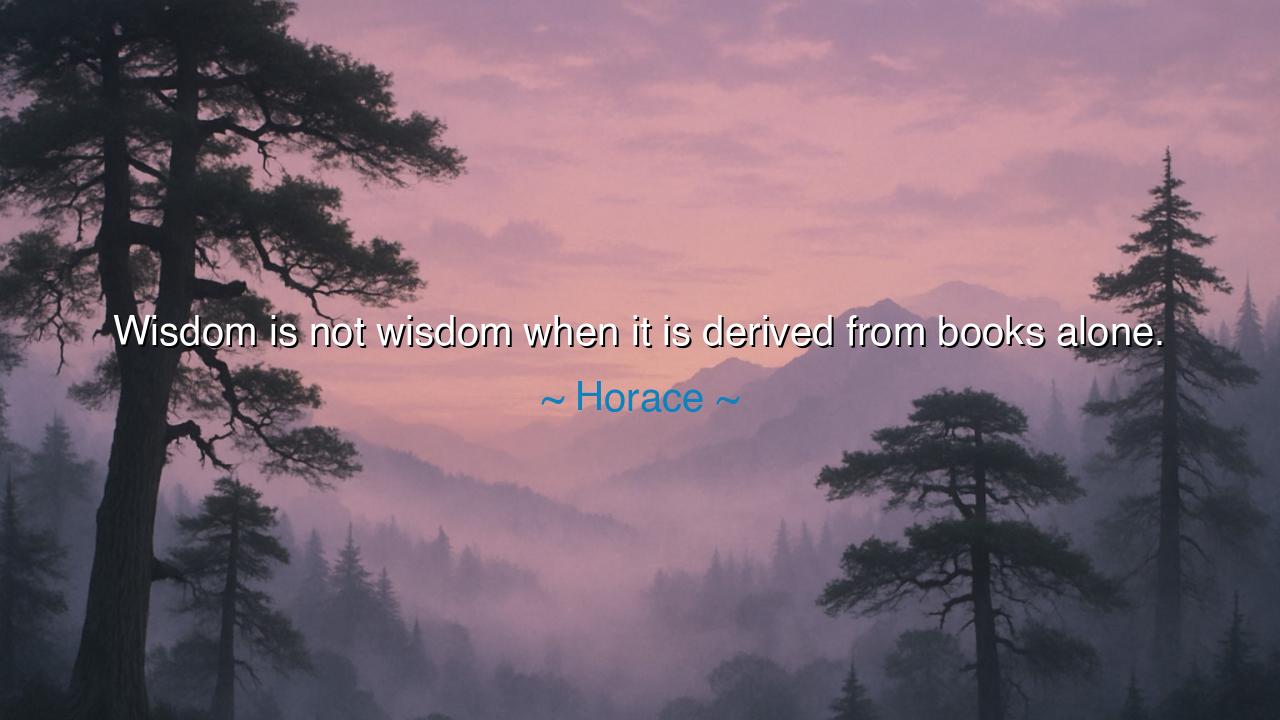
Wisdom is not wisdom when it is derived from books alone.






"Wisdom is not wisdom when it is derived from books alone." These profound words by Horace, the great Roman poet and philosopher, echo with a deep understanding of the nature of knowledge. In an age when the written word was regarded as a source of great power, Horace challenges us to consider that true wisdom is not merely a collection of facts, nor is it found solely in the pages of a book. The most powerful kind of wisdom, the kind that transforms lives and guides souls, comes from the living experience—from the trials and triumphs of the heart, from the lessons that life itself teaches us, often in the harshest and most unexpected ways.
Throughout history, the greatest minds did not solely rely on books for their wisdom. Socrates, perhaps the wisest of the ancient philosophers, spent little time with books. His wisdom came from the questions he asked, from the conversations he held with the people of Athens. Through dialogue, through engagement with the world around him, he sought the deeper truths of life. Plato and Aristotle, his students, built on this foundation, but they too understood that wisdom cannot be gained from books alone. It is the act of living, of engaging with others, of making mistakes and learning from them, that shapes the mind and spirit.
One might look at the story of Alexander the Great to understand this deeper meaning. Alexander was educated by the great philosopher Aristotle, who taught him from the wealth of knowledge found in books, in writings, and in ancient scrolls. Yet, it was Alexander's courage in battle, his ability to make decisions in the heat of war, and his deep understanding of the people he led that turned him into one of history’s greatest leaders. His wisdom did not come solely from his education, but from his experiences on the battlefield, from the people he met, and from the challenges he overcame. His leadership was shaped by what he learned in the real world, not just what he read in his tutoring sessions. His story teaches us that the greatest wisdom is formed through action, through living out the knowledge we acquire, and adapting it to the ever-changing circumstances of life.
In the ancient world, wisdom was seen as something that grew through experience. Consider the Stoics, who believed that true wisdom came from facing hardship with grace and resilience. Epictetus, a former slave, did not derive his wisdom from books alone. His wisdom came from his suffering, from his ability to control his mind and emotions in the face of adversity. His teachings were grounded not in theoretical knowledge, but in the practice of virtue in daily life. Marcus Aurelius, too, was not simply a philosopher because of his education, but because he applied Stoic principles as a ruler, leading the Roman Empire through some of its darkest years with wisdom born of personal reflection and experience.
Horace’s wisdom reminds us that knowledge, while essential, is incomplete without the personal experience that gives it meaning. Books can teach us about the world, but they cannot prepare us for the complexity of human emotions, relationships, or the unpredictable flow of life. Books cannot teach us courage, nor can they teach us how to navigate the intricacies of love or loss. It is in the real world, through the tests of time, the relationships we forge, and the challenges we face, that we gain the wisdom that truly matters. It is this wisdom that shapes our character, guides our decisions, and enables us to live with integrity and purpose.
The lesson, then, is clear: we must not rely solely on books for our wisdom. Books are valuable, they offer us insights, and they provide us with the teachings of the past. But true wisdom arises from the way we live, from how we engage with the world around us, from the choices we make in the face of adversity. Wisdom is not a passive experience—it is an active one. It is something we cultivate through action, through reflection, and through a willingness to grow in the face of life’s challenges. The greatest wisdom comes from the integration of knowledge with life experience, where what we learn from the pages of books becomes a living, breathing force that shapes who we are and how we move through the world.
Thus, let us seek wisdom not only in the written word, but in the experiences that life offers us each day. Let us live fully, with an openness to learning, reflecting, and growing. In the moments of hardship, in the victories and defeats, we will find the wisdom that is most lasting. Books may teach us, but life is where the greatest wisdom is forged. True wisdom, as Horace teaches us, is the blending of learning with living, and it is this combination that leads us to a life well-lived, filled with purpose and understanding. Let us be mindful of this truth, and seek to grow, not only in knowledge but in experience, for it is through this growth that we become truly wise.






AAdministratorAdministrator
Welcome, honored guests. Please leave a comment, we will respond soon